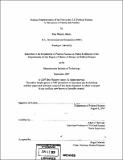Political representation of the poor in the U.S. political system : a discussion of theory and practice
Author(s)
Hardy, Erin Flaherty
DownloadFull printable version (6.488Mb)
Other Contributors
Massachusetts Institute of Technology. Dept. of Political Science.
Advisor
Adam J. Berinsky.
Terms of use
Metadata
Show full item recordAbstract
This thesis examines the nature of political representation of the American poor from both a theoretical and an empirical perspective. A normative framework, based on the major theories of representation, is used to examine the empirical mechanisms through which the poor can obtain representation. "Formal" mechanisms include voting, formal participatory activities and membership in political institutions. The primary "informal" mechanism examined is the public opinion survey. The normative framework is grounded in the notion that being poor in an affluent nation is an attached, personal interest--a substantive understanding of the interests of the poor cannot be determined through intellectual deliberation alone. Social and economic closeness (or similarity in relevant descriptive characteristics such as income and race) informs poverty advocates about the nature of poverty and the impact of anti-poverty policies. A significant amount of evidence suggests that the poor are underrepresented (relative to other groups with more economic and political resources) in formal participation mechanisms. There is less evidence about how well and to what extent the poor are represented in the primary "informal mechanism"--public opinion. Preliminary evidence suggests that the political voice of the poor and their advocates may be muted in opinion polls. This research motivates the original empirical analysis in this thesis that examines who is advocating for the poor in public opinion surveys and what those advocates are saying. The original research produces two key findings. First, over the longer term period (1980s-2002) descriptive similarity of poverty advocates declined. . (cont.) Second, in the more recent time period (mid-1990s-2002) descriptive similarity increased amongst poverty advocates in open-ended survey questions (which measure salience of opinion) yet declined amongst poverty advocates in close-ended questions (which measure direction of opinion). The disconnect between the results of the salience and directional analyses suggests that while descriptively similar survey respondents have found poverty to be a more salient issue since the mid-1990s, increased salience did not translate into preferences for expansion of existing anti-poverty programs. These findings raise questions about competence of representation of our nation's poor and have meaningful implications for the future of U.S. anti-poverty policy in an age of inequality
Description
Thesis (S.M.)--Massachusetts Institute of Technology, Dept. of Political Science, 2007. Includes bibliographical references (leaves 82-83).
Date issued
2007Department
Massachusetts Institute of Technology. Department of Political SciencePublisher
Massachusetts Institute of Technology
Keywords
Political Science.